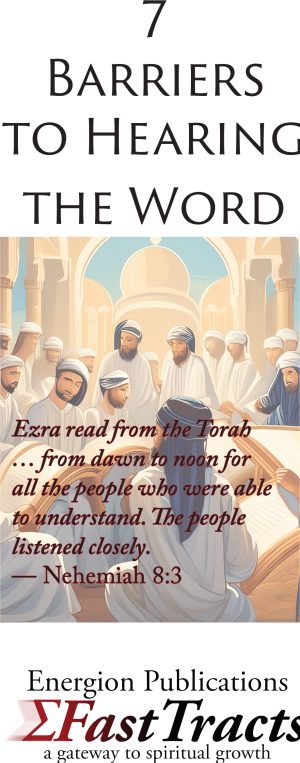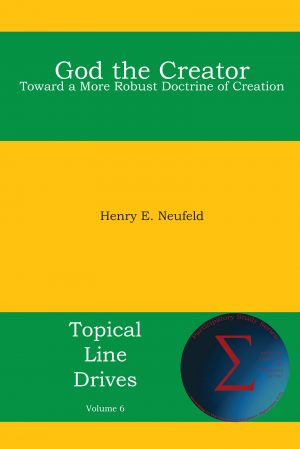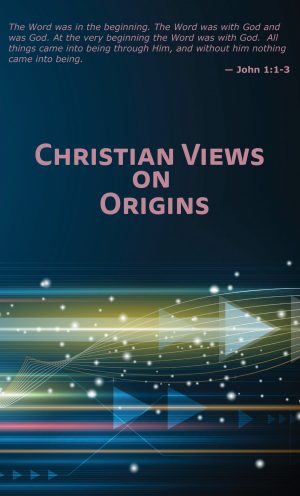The Variety of Christian Views on Origins
$0.00
Available
Description
(This was originally God the Creator, which is the title shown on the PDF below, but the booklet will have the new title The Variety of Christian Views on Origins.)
| A non-judgmental look at various views on creation held by Christians. This pamphlet examines the major views and some of the essentials that unite us despite differences in the details. This pamphlet does not argue one position or another, and so it is useful as a basis for discussion amongst Christians who differ on their interpretation of Genesis.
It is designed to be printed on 8 1/2 x 14 paper and folded in four. |
Pamphlet text content below. Note that the FastTracts books are being edited, and their text may differ.
Let the glory of the LORD be eternal. – Psalm 104:31
What are the major views about creation?
Christians and non-Christians alike have held a variety of views both about the source of life and about how the variety of life on earth today arose.
Young earth creationists1 generally believe that:
- The earth is about 6000 years old
- The days of Genesis 1 should be taken literally as 24 hour periods
- There are major, fixed kinds of creatures and that while changes can occur within such a kind, one kind cannot change into another
Amongst many others, major representatives of this view include Dr. Henry Morris and Dr. Gary Parker of the Institute for Creation Research (ICR, http://www.icr.org). Parker and Morris are the authors of What is Creation Science? (link to my review)
Old earth creationists generally believe that:
- The earth is old (4.5 billion years) and the universe is old (12+ billion years)
- The days of Genesis 1 should be taken as periods of time
- God created continually or in phases over a period of time
- Some aspects of creation, such as formation of stars continue into the present
- A great deal of variation is possible among creatures according to God’s fixed laws, so that a good deal of the variety of life can result from progressive or evolutionary change
Some key representatives of this view include Dr. Gleason Archer, and Dr. Hugh Ross (Reasons to Believe, http://www.reasons.org).2
Theistic evolutionists3 generally believe that:
- The earth is old (4.5 billion years) and the universe is old (12+ billion years)
- The days of Genesis 1 represent a statement understandable to a pre-scientific age
- God used the various processes and mechanisms of evolution in creating the variety of life, much as he uses other natural laws on a continuing basis
Representatives of this view include M. A. Corey, Back to Darwin: The Scientific Case for Deistic Evolution and Howard J. Van Till, author of The Fourth Day.
Non-theistic evolutionists generally teach the same processes as theistic evolutionists, but would not refer to God as the source of any order or of life.4
A good presentation of this view can be found in The Blind Watchmaker by Richard Dawkins, especially chapters 1-3 and 6.
There are many variations in these views, and some people might accept some points from one and some from another. In particular, there are many different varieties of old earth creationists and theistic evolutionists. Christians have held any of the first three views.
What are some broad essentials of the Biblical doctrine of creation?
There is some disagreement about what is essential, but the following broad outlines are quite clear in a Biblical view of origins.
- God is the creator of everything (Genesis 1:1-2:4a, Psalm 104:24, Hebrews 1:2, Romans 11:33-36)
- God creates by simple command so His word is certain (Psalm 33:6-9)
- God put personal care into creation (Genesis 2:4b-25)
- Human beings were created in God’s image (Genesis 1:27), they were good (Genesis 1:31), and later they fell from that state (Genesis 3)
- God created wisely (Psalm 104:24, Proverbs 8:22-31)
- God continuously cares for His creation (Psalm 104, Acts 17:26-29)
What is flood geology?
Many young earth creationists believe also that most of the geological record was created by the flood and the time shortly thereafter. This fits with their belief that the earth is very young. A young earth would not provide time for the formation of major geological features we see today without some major event.
Many old earth creationists and theistic evolutionists hold that the flood was not global, but rather more localized and destroyed the civilization of the time.
What about genealogies? Can we find out exactly how old the earth is from those?
Those who take the days of Genesis 1 literally generally take all the times in the genealogies as complete and accurate. Many interpreters, however, maintain that there can be large gaps in the genealogies. We should be aware that sincere and informed Christians have viewed these passages in different ways.
Do evolutionists teach that life came from non-living matter by accident?
Theistic evolutionists do not believe that the processes involved in origins, whether of the universe itself or of life on earth, are random, but rather that God has fashioned a set of laws which result naturally in the appearance of life as we know it.5 They marvel at the order that comes from apparent chaos and see the tremendous power of God in action in every example of order and in each living thing.
Non-theistic evolutionists also do not consider evolution to be a random process. The question is what the source of order could be.
Notes
1Many who believe in a young earth object to being called young earth creationists and prefer to be called just “creationists” but since this pamphlet deals with more than one view, the distinction is maintained.
2A variation of this view is the ruin and restoration theory, which holds that the earth was created, became formless and void, and that Genesis 1 describes a recreation.
3Some object to the terms “creationist” and “evolutionist” since neither is a complete philosophical or religious system. The terms are convenient, however.
4Many theistic evolutionists would not mix their teaching of science with their religious views about the source of all order.
5Strictly speaking, the origin of life from non-living matter is called “abiogenesis” which is not a part of the biological theory of evolution. Biological evolution deals with how life on earth became so varied.
How marvelous are your works, 0 Lord! You made them all wisely. The earth is full of your created things. – Psalm 104:24
Some other resources on Energion.com about creation include:
Evolution and Faith. This “Threads” essay discusses the issues of evolution and our faith in God. It is brief, as are all the “Threads” essays.
God, Creator and Sustainer. This paper on Psalm 104 that I wrote while in graduate school was the starting point for many of my ideas about creation and evolution and the relationship of both to faith.
Review of “What is Creation Science”. In my review of this book I give a number of my reasons for opposing the creation science movement.
Creation vs Evolution from Henry’s Links Source
Includes links from all of the major positions on this issue.
The combination of the above thoughts will tell you why I believe acceptance of a particular view of creation is an unacceptable barrier at the door of Christianity.
All scripture quotations taken from the Contemporary English Version, Copyright © 1995 American Bible Society.
Copyright © 2004, Henry E. Neufeld
Rev. 1.0









Reviews
There are no reviews yet.